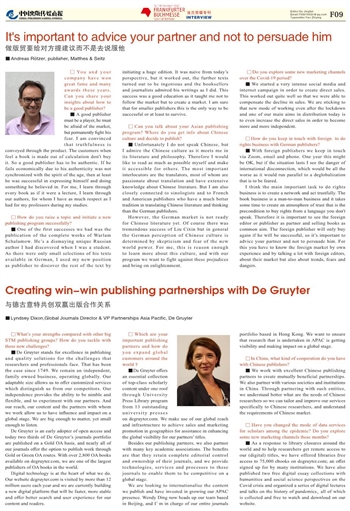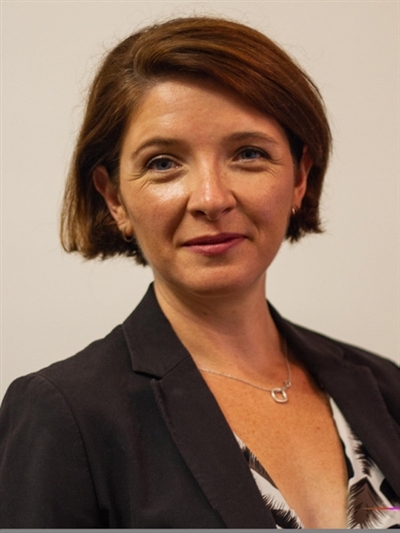■Lyndsey Dixon,Global Journals Director & VP Partnerships Asia Pacific, De Gruyter
□What’s your strengths compared with other big STM publishing groups? How do you tackle with these new challenges?
■De Gruyter stands for excellence in publishing and quality solutions for the challenges that researchers and professionals face. That has been the case since 1749. We remain an independent, family owned business, operating globally. Our adaptable size allows us to ofer customized services which distinguish us from our competitors. Our independence provides the ability to be nimble and flexible, and to experiment with our partners. And our reach, our content and the partners with whom we work allow us to have infuence and impact on a global stage. We are big enough to matter, yet small enough to listen.
De Gruyter is an early adopter of open access and today two thirds of De Gruyter’s journals portfolio are published on a Gold OA basis, and nearly all of our journals ofer the option to publish work through Gold or Green OA routes. With over 2,800 OA books available on degruyter.com, we are one of the largest publishers of OA books in the world.
Digital technology is at the heart of what we do. Our website degruyter.com is visited by more than 12 million users each year and we are currently building a new digital platform that will be faster, more stable and offer better search and user experience for our content and readers.
□Which are your important publishing partners and how do you expand global customers around the world?
■De Gruyter ofers an essential collection of top-class scholarly content under one roof through University Press Library program from 13 outstanding university presses on degruyter.com. We make use of our global reach and infrastructure to achieve sales and marketing promotion in geographies for assistance in enhancing the global visibility for our partners’ titles.
Besides our publishing partners, we also partner with many key academic associations. The benefts are that they retain complete editorial control and ownership of their journals, and we provide technologies, services and processes to these journals to enable them to be competitive on a global stage.
We are looking to internationalise the content we publish and have invested in growing our APAC presence. Wendy Ding now heads up our team based in Beijing, and I’ m in charge of our entire journals portfolio based in Hong Kong. We want to ensure that research that is undertaken in APAC is getting visibility and making impact on a global stage.
□In China, what kind of cooperation do you have with Chinese publishers?
■We work with excellent Chinese publishing partners to create mutually beneficial partnerships. We also partner with various societies and institutions in China. Through partnering with such entities, we understand better what are the needs of Chinese researchers so we can tailor and improve our services specifically to Chinese researchers, and understand the requirements of Chinese market.
□Have you changed the mode of data services for scholars among the epidemic? Do you explore some new marketing channels these months?
■As a response to library closures around the world and to help researchers get remote access to our (digital) titles, we have offered libraries free access to 75,000 ebooks on degruyter.com; an ofer signed up for by many institutions. We have also published two free digital essay collections with humanities and social science perspectives on the Covid crisis and organized a series of digital lectures and talks on the history of pandemics, all of which is collected and free to watch and download on our website.



